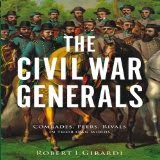By Robert I. Girardi
Do you ever wonder what your friends, peers, rivals or your
sworn enemies think about you? It is not
an uncommon question of curiosity.
Sometimes it can take years or even decades to find out such
information. More often than not we go
to our graves not knowing what many people thought of us.
Through contemporary newspaper articles, post-war memoirs
and journal articles many generals who survived the fiery trial of the American
Civil War discovered how great or poor their reputations were, but these public
writings are only the tip of the humility iceberg. Most would die before collections of
correspondence and diaries would be published with the whole unvarnished truth
of what their friends and enemies said about them.
Do you think Major Daniel E. Sickles would care if he
learned that Alpheus Williams said that he was “a hero without an heroic deed?” How would Confederate General John Bell Hood
have done if he had known that Union Major General William T. Sherman thought “he
is reckless of the lives of his men?”
Would Major General George B. McClellan’s head swell with pride if he
learned that George Armstrong Custer said he “would forsake everything and
follow him to ends of the earth?”
Nearly one hundred and fifty years have passed since the
guns fell silent over the battlefields of the Civil War. Both academically trained and amateur historians
are still sifting through the voluminous detritus of the war in archives and
libraries all across the country to reconstitute and reshape our historical
past.
Historian, Robert I. Girardi, earned his Masters of Arts
degree in Public History at Loyola University of Chicago in 1991, and has authored
or edited ten books. His latest work, “The
Civil War Generals: Comrades, Peers, Rivals in their own Words,” has given the
idea of a biographical dictionary of Civil War era personalities a little bit
of a twist. Each entry includes a photograph
of its subject, when available, his rank, year when graduated from the United
States Military Academy at West Point (if applicable), prior military
experience (i.e. Mexican War Veteran), and commands held. The remainder of each
entry provides quotes of what other notable historical figures of the era had
to say about the subject. Each quote is
sourced, with its author, work and page number.
Though “The Civil War Generals” has chapter an opening
chapter with quotes “On Generalship,” a chapter of “Composite Quotes,” and
three appendices of Maps, The Contributors, and The Battles, the bulk of the
book is devoted to the Generals of the North and South. With 167 pages devoted to the Union generals
and 66 to the generals of the Confederacy, there is a bit of a disparity. Considering more memoirs, collections of
correspondence and diaries were published from the War’s participants who were
clad in blue rather than those who wore the gray, and coupled with the fact The
North had more man-power and therefore more generals that The South, that
disparity can easily be explained.
“The Civil War Generals” is a fantastic addition to the
libraries of Civil War scholars and casual readers alike. It offers an easy, one-volume, cross
reference guide of the reputations, warts and all, of the generals who waged
war with and against each other from 1861 to 1865.
ISBN 978-0760345160, Zenith Press, © 2013, Hardcover, 304
pages, Maps, Photographs, Appendices, Bibliography & Index. $28.00. To Purchase this book click HERE.

No comments:
Post a Comment